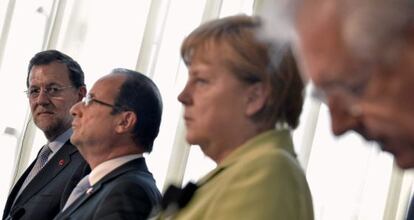Rajoy's jump onto the global stage
The PM has attended more international meetings in one week than in eight years

During his eight years as opposition leader, Mariano Rajoy never traveled to the United States. He only made two lightning trips to Argentina and Colombia, and visited a few European countries as Popular Party (PP) president. He even missed several meetings with the European People's Party (EPP) in Brussels. The pragmatic and little-traveled Rajoy - who also continues to have some problems with foreign languages, but is improving his English - had different priorities. He religiously adhered to that famous advice once given to Prime Minister José María Aznar - "less Syria and more Soria" - and focused mainly on domestic issues during last year's elections, in particular in Andalusia and Catalonia. He would leave international policy for a future date. But last week that "future" suddenly arrived.
To the prime minister's dismay, Spain is in the eye of the global economic hurricane. And in one week, Rajoy has had to attend more international meetings than he ever had to in eight years. The prime minister is convinced that all has gone well, despite the fact that the week started off badly.
Rajoy arrived Sunday in Los Cabos, Mexico to participate in his first G20 summit. It was a very muddled debut - Spain was the topic of conversation and the talk wasn't good. When he arrived at his luxury hotel, Rajoy was elated: "What is happening in Greece is good news for Spain and the euro."
But right after that moment, things started to go wrong. Spain's risk premium reached nearly 600 points and the stock market in Madrid plunged. Doubts about the Spanish bank bailout also began to weigh in. The "good news" was not working.
Even in Los Cabos, things were not going well. Appointments Rajoy had scheduled with Chinese President Hu Jintao, Russia's Vladimir Putin and Brazil's Dilma Rousseff fell through. The prime minister spent the morning in his room analyzing the events of a very difficult day.
Economy Minister Luis de Guindos was able to squeeze in a meeting with IMF director Christine Lagarde. In the same hotel where Rajoy was staying, Italian Prime Minister Mario Monti organized several bilateral meetings while Rousseff met with Argentinean President Cristina Fernández de Kirchner - Rajoy's enemy. Angela Merkel didn't waste any time either, and met privately with Barack Obama.
Rajoy began his first summit with zero appointments. But little by little, the week began straightening out
In the end, Rajoy began his first summit with zero appointments. But little by little, the week began straightening out. All the nations agreed they must work together to turn the world economy around. Rajoy was able to meet with Hu Jintao and Rousseff, but his meeting with Putin never panned out.
Rajoy hurried away from Los Cabos for a stopover in Brazil to look for investors, but his priority was to encourage Rousseff to visit Spain later this year to attend the Ibero-American Summit in Cádiz.
On Friday, Rajoy was in Rome for a quick meeting of the leaders of the four largest euro economies. The risk premium was under 500 points by now. Everything seemed to be going his way, but not the way he had planned.
When he came to power, Rajoy sided with Merkel. But since then he has ruled out her strict austerity vision for Europe. Rajoy has now positioned himself with Monti and French President François Hollande, who are demanding more EU growth measures. His allegiance to the German chancellor has evaporated.
Tu suscripción se está usando en otro dispositivo
¿Quieres añadir otro usuario a tu suscripción?
Si continúas leyendo en este dispositivo, no se podrá leer en el otro.
FlechaTu suscripción se está usando en otro dispositivo y solo puedes acceder a EL PAÍS desde un dispositivo a la vez.
Si quieres compartir tu cuenta, cambia tu suscripción a la modalidad Premium, así podrás añadir otro usuario. Cada uno accederá con su propia cuenta de email, lo que os permitirá personalizar vuestra experiencia en EL PAÍS.
¿Tienes una suscripción de empresa? Accede aquí para contratar más cuentas.
En el caso de no saber quién está usando tu cuenta, te recomendamos cambiar tu contraseña aquí.
Si decides continuar compartiendo tu cuenta, este mensaje se mostrará en tu dispositivo y en el de la otra persona que está usando tu cuenta de forma indefinida, afectando a tu experiencia de lectura. Puedes consultar aquí los términos y condiciones de la suscripción digital.









































